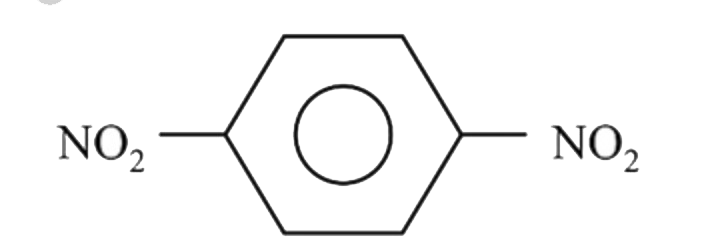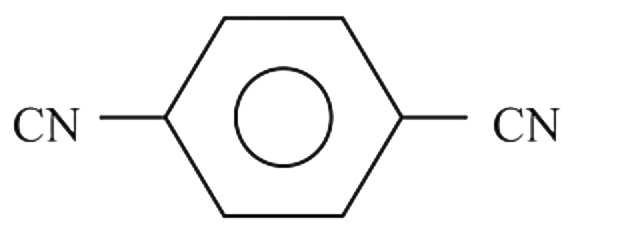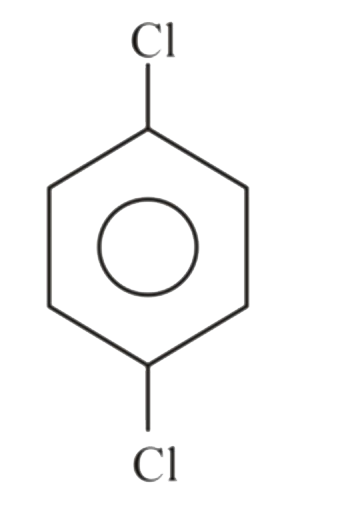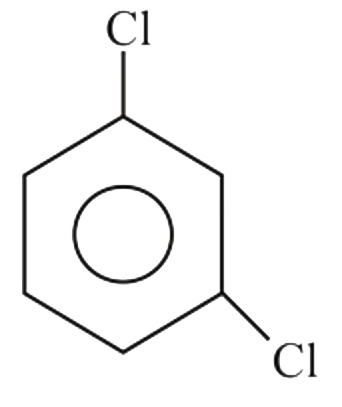Which of the following compounds would you expect to have a dipole moment ?




The correct Answer is:D
To determine which of the given compounds has a dipole moment, we need to analyze the molecular structure and the electronegativity of the atoms involved in each compound. Here's a step-by-step breakdown of the solution:
Step 1: Understand Dipole Moment
A dipole moment occurs when there is a separation of charge in a molecule, typically due to differences in electronegativity between bonded atoms. A molecule will have a dipole moment if it has polar bonds that do not cancel each other out.
Step 2: Analyze Each Compound
1. 1,4-Dinitrobenzene:
- Structure: A benzene ring with two nitro (NO2) groups at the para position.
- Electronegativity: Nitrogen is more electronegative than carbon, so the dipole moments from each NO2 group point towards the nitro groups.
- Result: The dipole moments cancel each other out because they are equal in magnitude and opposite in direction. Dipole Moment = 0.
2. 1,4-Dicyanobenzene:
- Structure: A benzene ring with two cyano (CN) groups at the para position.
- Electronegativity: Carbon in CN is more electronegative than hydrogen, so the dipole moments point towards the cyano groups.
- Result: Similar to the first compound, the dipole moments cancel each other out. Dipole Moment = 0.
3. 1,4-Dichlorobenzene:
- Structure: A benzene ring with two chloro (Cl) groups at the para position.
- Electronegativity: Chlorine is more electronegative than carbon, so the dipole moments point towards the chlorine atoms.
- Result: The dipole moments cancel each other out. Dipole Moment = 0.
4. Meta-Dichlorobenzene:
- Structure: A benzene ring with two chloro (Cl) groups at the meta position.
- Electronegativity: The dipole moments from each chlorine atom point towards the chlorine atoms.
- Result: The dipole moments do not cancel out due to their arrangement, leading to a net dipole moment. Dipole Moment ≠ 0.
Step 3: Conclusion
After analyzing all four compounds, we find that only the meta-dichlorobenzene has a non-zero dipole moment due to the arrangement of the chlorine atoms. Therefore, the correct answer is:
Option 4: Meta-Dichlorobenzene has a dipole moment.
---
A dipole moment occurs when there is a separation of charge in a molecule, typically due to differences in electronegativity between bonded atoms. A molecule will have a dipole moment if it has polar bonds that do not cancel each other out.
1. 1,4-Dinitrobenzene:
- Structure: A benzene ring with two nitro (NO2) groups at the para position.
- Electronegativity: Nitrogen is more electronegative than carbon, so the dipole moments from each NO2 group point towards the nitro groups.
- Result: The dipole moments cancel each other out because they are equal in magnitude and opposite in direction. Dipole Moment = 0.
- Structure: A benzene ring with two cyano (CN) groups at the para position.
- Electronegativity: Carbon in CN is more electronegative than hydrogen, so the dipole moments point towards the cyano groups.
- Result: Similar to the first compound, the dipole moments cancel each other out. Dipole Moment = 0.
- Structure: A benzene ring with two chloro (Cl) groups at the para position.
- Electronegativity: Chlorine is more electronegative than carbon, so the dipole moments point towards the chlorine atoms.
- Result: The dipole moments cancel each other out. Dipole Moment = 0.
- Structure: A benzene ring with two chloro (Cl) groups at the meta position.
- Electronegativity: The dipole moments from each chlorine atom point towards the chlorine atoms.
- Result: The dipole moments do not cancel out due to their arrangement, leading to a net dipole moment. Dipole Moment ≠ 0.
After analyzing all four compounds, we find that only the meta-dichlorobenzene has a non-zero dipole moment due to the arrangement of the chlorine atoms. Therefore, the correct answer is:
Similar Questions
Knowledge Check
Which of the following compounds would you expect to be strongest carbon acid ?
A B
B CCH2(CO2Et)2DCH3COCH2COOC2H5
CCH2(CO2Et)2DCH3COCH2COOC2H5Which of the following carbonates would you expect to rearrange?
A B
B C
C D
D
Out of the following compounds, which one will have a zero dipole moment?
A1, 1-DichloroethyleneBcis-1, 2-DichloroethyleneCtrans-1, 2-dichloroethyleneDnone of these compounds.
Which of the following compounds will have the highest dipole moment ?
View SolutionBy considering their position in the Periodic Table, which one of the following elements would you expect to have maximum metallic characteristic?
Ga Ge As Se Be
View SolutionWhich of the following pairs of species would you expect to have largest difference in spin only magnetic moment ?
View SolutionIn the crystals of which of the following ionic compounds would you expect maximum distance between the centres of the cations and anion?
View SolutionWhich one of the following acids would you expect to be the strongest?
View Solution
